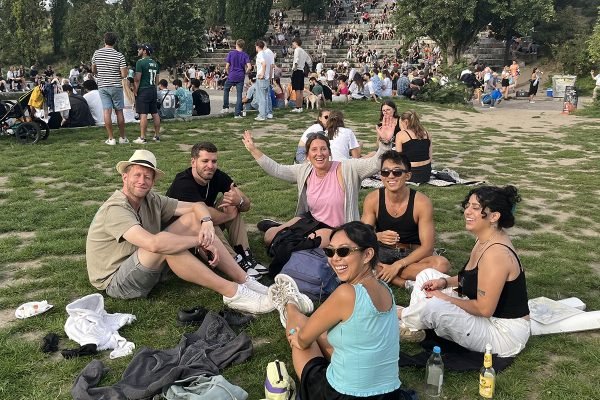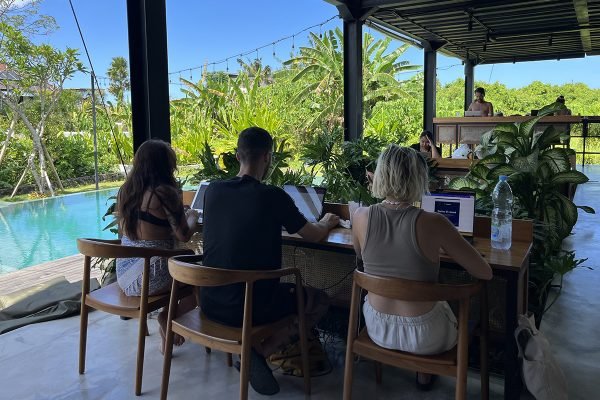Are you interested in learning a new language because of personal interest or because you’re moving to a new country? Learning a new language is not only very useful when you’re going to live abroad, but it’s also something personally and professionally rewarding.
Benefits of Learning a New Language
On a Personal Level
- Being able to communicate with locals when you’re travelling or living in another country (and at the same time being more accepted and respected because you speak their language)
- Accomplishment of having learned a new language
- Making new friends
- If you speak other languages than the local language of the country where you are living, it can still be very useful and help you connect with other foreigners who speak that language.
On a Professional Level
- Being able to study or work in another language
- Have access to more job opportunities
- More chances of finding a job abroad
- Having access to more resources and content
- Connecting with your colleagues and business partner on a deeper level
If you will be studying or working abroad in another language, it’s essential that you try to improve your level as much as possible before you arrive in your new country. When you arrive, you’ll already be overwhelmed with everything that you need to do to settle down. You won’t be wanting to focus on taking classes and studying a new language. Once you start working or going to school in that language, it will be very exhausting! Try to improve your level and practise as much as possible beforehand and it will make your arrival way easier! If you don’t have time to improve enough before your stay abroad, consider arriving a few weeks in advance and take some intensive classes.
Tips to Improve Your Language Skills
Whether you’re starting to learn a language from home or from the country where you’re going to live, and whatever your level is, here are some different ways to learn a language or improve your language skills.
Take Language Classes
Taking traditional in-person language classes remains the most popular way to get the basis of a language, especially if you’re learning a language from scratch.
Places Where You Can Take Language Classes
- University & Colleges
- For-credit language courses: Regular classes giving you credits will usually have a big workload and many evaluations, but the credits can potentially go towards a degree.
- Not-for-credit language courses: Some universities offer different language classes that don’t require any homework or evaluations, and can be cheaper than for-credit classes. For example, at Université de Montréal, you can take evening classes at their Cultural Activities department.
- Language Schools
- There are usually many language schools in big cities that are dedicated to language learning.
- Community centres (ex.YMCA), libraries, municipalities
- Private lessons & tutors
- Online classes (group or individual)
Learn on Your Own With a Textbook
The best way to learn on your own is by using a textbook, where there will be some theory and exercises for you to learn and practise on your own.
One of the best brands of textbooks to learn a language on your own is Assimil. It’s a small book that fits in a purse where each chapter has theory and practice. What’s great is that they explain in detail the expressions and verbal periphrasis, which makes you communicate with locals faster.
You can also use the bigger textbooks that are usually used in language classes. They have all of the explanations and exercises as well. You can ask your university which textbook they use for each of their levels and just buy that book without going to class. You can browse in the foreign-language section of your local library and you’ll certainly find some textbooks for the language that you are learning. Or order a copy online.
If you need to achieve a certain level by a certain date for a certification for study abroad or for a work permit, you can just buy the textbooks up to that level and study these before your exam.
Speak the Language as Often as Possible
Although learning the language is important, what will really make a difference with your language skills is to practise as often as possible, especially with a person who speaks natively the language that you are learning. When you practise during a language class, you are practising with someone who speaks the same level as you. You will learn a lot more by practising with a native speaker, who uses more advanced expressions.
Do a Language Exchange
The best way to practise a language is by doing a language exchange. When you do a language exchange with someone, you meet whenever and wherever you want, and talk in the language that you want to improve for half the duration of the meeting, and then practise the language that you speak and that your partner wants to learn for the other half of the meeting.
For example, you can decide to meet up once a week for 2 hours, and speak Spanish for 1 hour and speak English for another hour. Or meet twice a week for 3 hours, etc. You and your partner decide on the duration and frequency. This can lead to a long-lasting friendship!
You can find a language exchange partner by going to a language exchange meetup. You can also find someone at work, at school, or by asking on Facebook groups “Who wants to do a language exchange with me? I’d like to learn X language, and I can help you practise X language.” Universities and language schools also usually offer a matching service for language exchanges.
If you can’t find someone with whom to do a language exchange in person in the city where you are, you can do a virtual language exchange online!
Language exchange meetups are usually held once or twice per week in major cities around the world. You can find out about these meetups on Facebook groups, and they are often advertised on meetup.com, on couchsurfing events, in language schools, or as a Facebook event. In many countries, these events are organised on Mundo Lingo.
Do a Language Immersion Abroad
If you have a few weeks or a few months to spare, you could go to another country and do a proper language immersion.
You can organise it by yourself by just going to take some lessons at a language school or learn on your own and speak the language with locals in your free time. Or you can also participate in a language immersion program where the classes, accommodation, activities and logistics are all organised, even sometimes the meals! Language schools usually offer these kinds of packages.
In some countries, you can get lessons and accommodation at a fraction of what you would pay back home. For example, Antigua, Guatemala is one of the most popular places to do a language immersion in spanish. You can take classes and stay in a homestay where you’ll live with a family and have 2 meals per day for as little as 30$ per day!
If you want to organise your language immersion it by yourself, the best way is to:
- Take lessons in a language school where they also have cultural activities.
- Learn on your own in your spare time.
- Stay with locals, either by doing a homestay where you’ll live with a family, or by living with roommates that speak the language that you’re learning.
- Participate in language exchange meetups and find a partner with whom to do a 1 on 1 language exchange.
- Make local friends with whom you can speak the language.
- Immerse yourself in the culture in that language: read the local newspaper, go to the cinema, see concerts, go to the museum, take a cooking class, attend local events, watch movies, listen to music, read books, etc.
- Volunteer with local organisations.
Use a Language Learning Apps
There are many popular apps available for free or at a low cost. It’s a completely different way of learning than by taking classes or learning with a textbook.
Popular Apps to Learn a Language
- DuoLingo
- Babbel
- Busuu
- Lingoda
- iTalki
Youtube and Social Media
You can find tons of free resources and lessons online on YouTube or on social media.
Watch Movies or TV shows
Watch movies in the language that you are learning, with subtitles in the same language. By doing so, it will be easier for you to understand the pronunciation. And by seeing the written words, you will also learn how to write at the same time.
It doesn’t have to be a movie original from that country (which can sometimes be hard to understand because of the accent and slang). For example, if you’re learning Spanish, you can find tons of American movies dubbed in Spanish. When they are dubbed, they also usually use a more neutral accent and less slang, which makes them easier to understand.
Travel a Country Where that Language is Spoken
When you’re travelling to another country, you’ll have the opportunity to practise your new language skills on many occasions, usually interacting with the staff at your accommodation, or when you’re out in restaurants, bars, stores, etc. Take advantage of being there to try to have more interesting conversations about other topics than the regular small talk at the hotel or restaurant! You could for example do a cooking class or go on a tour in that language, or buy the newspaper or a magazine in that language! Try to meet local people by following our tips about how to make friends in a new country.
Other Tips to Help You Learn a New Language
- Read the news in the language that you’re learning
- Listen to music in that language – and read the lyrics
- Change your phone and computer settings to that language
- Use language learning software
- Interact with Artificial Intelligence in that language. For example, tell Chat-GPT to have a conversation with you in Spanish and tell it to correct you when you make mistakes. Tell it your level, to practice a specific verb tense or to talk about a specific topic that you’d like to practice.





